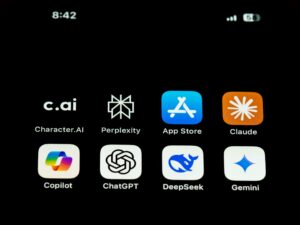Microsoft Introduces Phi-4 Reasoning AI Models to Compete with DeepSeek R1

Microsoft Introduces New AI Models for Edge Devices
Microsoft has unveiled an exciting new trio of AI reasoning models known as Phi-4-reasoning, Phi-4-reasoning-plus, and Phi-4-mini-reasoning. These models are designed specifically for use on edge devices, which include Windows PCs and mobile devices, making them highly accessible for everyday users.
Overview of the Phi Models
Phi-4-Reasoning
The core model, Phi-4-reasoning, boasts training on an impressive 14 billion parameters, allowing it to tackle complex reasoning tasks efficiently. This enables the AI to analyze and process information similarly to human reasoning, offering a more intuitive user experience.
Enhanced Performance with Phi-4-Reasoning-Plus
The Phi-4-reasoning-plus model is built on the same foundation as the basic version, yet it enhances performance by utilizing approximately 1.5 times more tokens for inference. Despite being more compact, the Phi-4 models exhibit competitive performance, rivaling significantly larger models such as DeepSeek R1, which contains 671 billion parameters, and o3-mini.
Phi-4-Mini-Reasoning
Completing the lineup is the Phi-4-mini-reasoning model, which is trained on just 3.8 billion parameters. Despite its smaller size, it outperforms several mid-range models (those with 7B to 8B parameters) in key benchmarks. This is a remarkable achievement, showcasing the potential of smaller models in handling tasks typically reserved for larger counterparts.
Benchmark Performance
The performance of these models has been evaluated against industry standards:
GPQA Benchmark
- Phi-4-reasoning-plus-14B: 69.3%
- o3-mini: 77.7%
- AIME 2025 Test
- Phi-4-reasoning-plus-14B: 78%
- o3-mini: 82.5%
These results indicate that while the Phi models are compact, they come extremely close to matching the capabilities of more prominent models, proving their effectiveness in real-world applications.
Fine-Tuning and Data Curation
Microsoft emphasizes the importance of meticulous data curation in training the Phi models. They were fine-tuned using high-quality synthetic datasets, derived from reasoning demonstrations and performances by larger models like o3-mini. This strategic approach demonstrates how smaller models can be made competitive through well-executed training methods.
The Phi-4-mini-reasoning model, in particular, has shown promising results across several benchmarks like AIME 24, MATH 500, and GPQA Diamond. Its competitive performance indicates that effective training can yield powerful outcomes, even with fewer parameters.
Application and Future Prospects
The Phi models are currently operational on Windows Copilot+ PCs, utilizing the built-in Neural Processing Unit (NPU) to enhance on-device AI performance. Their implementation signifies a significant leap forward in making sophisticated AI capabilities available to users without relying on extensive cloud resources.
With the introduction of these models, Microsoft appears poised to improve the user experience substantially in personal computing and mobile applications. The evolution of these AI models reflects a broader trend toward efficient, effective democratization of AI technology, allowing more users to harness advanced computational reasoning in their daily tasks.
The future of AI is bright, especially with advancements like Microsoft’s Phi models, which seamlessly blend power and accessibility. As these technologies mature, we can expect continued enhancements that will transform how we interact with our devices.






